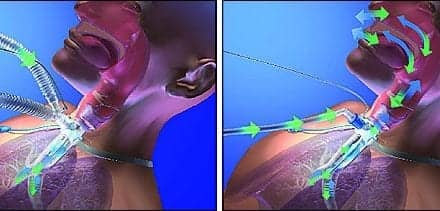New research has shown that the behavior of a type of white blood cell, called neutrophils, changes when patients have COPD. Normally neutrophils remove bacteria from the lungs by ‘eating’ them, a highly efficient process called phagocytosis that causes no damage to the lung.
This study, however, shows that in patients with COPD, the ability to eat bacteria is greatly reduced and instead the neutrophils are forced to trap bacteria in large webs called Neutrophil Extracellular Traps (NETs). This process is much more damaging to the lung as the NETs contain chemicals to kill the bacteria that also make the lungs more inflamed.
In the study of 99 COPD patients, published in the Journal of Allergy and Clinical Immunology, levels of NETs were measured using a new laboratory test designed by the researchers. This showed that patients with increased NET levels in their lungs suffered from more severe COPD and experienced more chest infections as a result.
Neutrophils May Be Causing Infections in COPD Patients









